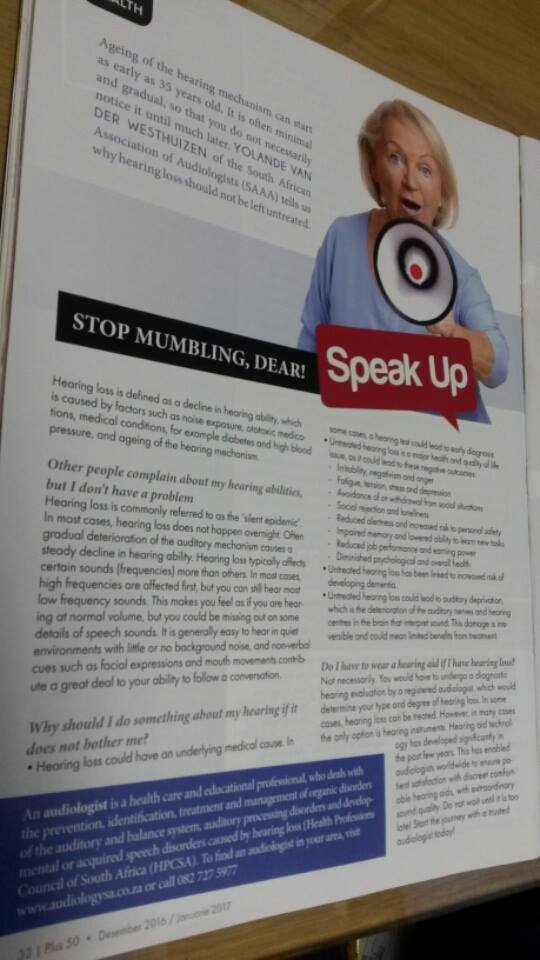
Spektrum Gehoor se artikel vir voelgoed.co.za – Desember 2016
December 14, 2016
Why shouldn’t I just buy an amplifying device or PSAP on the internet or over the counter?
May 5, 2017 Hearing loss is defined as a decline in hearing ability that is caused by a variety of factors such as noise exposure, ototoxic medications, medical conditions such as diabetes, high blood pressure as well as ageing of the hearing mechanism.
Hearing loss is defined as a decline in hearing ability that is caused by a variety of factors such as noise exposure, ototoxic medications, medical conditions such as diabetes, high blood pressure as well as ageing of the hearing mechanism.
Ageing of the hearing mechanism can start as early as 35 years of age – often minimal and gradual – to such an extent that you do not necessarily notice it until much later.
Why it is that other people seem to complain about my hearing abilities without me even noticing a problem?
Hearing loss is commonly referred to as the ‘Silent epidemic’. In most cases hearing loss does not happen overnight – it is often a gradual process of deterioration of the auditory mechanism that causes gradual decline in hearing abilities. Hearing loss also typically affects some sounds (frequencies) more than others – in most cases high frequencies are affected first, while the individual can still hear most low frequency sounds. This causes you to feel as if you are hearing at a normal volume, but in fact you could be missing out on some details of speech sounds. It is also generally easy to hear in quiet environments with little to no background noise, while non-verbal cues such as facial expression and mouth movement contributes a great deal to your ability to follow a conversation.
I suspect that I might have a slight problem, why should I do something about it if it doesn’t bother me?
- Hearing loss could have an underlying medical cause and a hearing test could in some cases lead to the appropriate early diagnosis thereof.
- Untreated hearing loss is a major health and quality of life issue – it could lead to:
- irritability, negativism and anger
- fatigue, tension, stress and depression
- avoidance or withdrawal from social situations
- social rejection and loneliness
- reduced alertness and increased risk to personal safety
- impaired memory and ability to learn new tasks
- reduced job performance and earning power
- diminished psychological and overall health
-

Untreated hearing loss has been linked to an increased risk of developing dementia.
- Untreated hearing loss can lead to auditory deprivation, which is in essence the deterioration of the auditory nerves and hearing centres in the brain responsible for interpretation of sound. This damage is irreversible and potentially means that very limited, if any, benefit will be available from treatment.
Do I have to wear a hearing aid if I have hearing loss?
Not necessarily. You will have to undergo a diagnostic hearing evaluation by a qualified and registered audiologist* which will determine the type and degree of hearing loss that you have. In some cases hearing loss are medically treatable, however in many cases the only treatment option is the use of hearing instruments. Hearing aid technology has developed significantly in the past few years and this has enabled audiologists worldwide to ensure patient satisfaction with discrete and comfortable hearing aids, with extraordinary sound quality.
Do not wait until it is too late!
Start the journey with a trusted audiologist today!
*An Audiologist is a health care and educational professional who deals with the prevention, identification, treatment and management of organic disorders of the auditory and balance system, auditory processing disorders and developmental or acquired speech disorders caused by hearing loss. (HPCSA: Health Professions Council of South Africa).
*Original article published in the Plus 50 Magazine, December 2016 / January 2017 edition (Page 32)*


